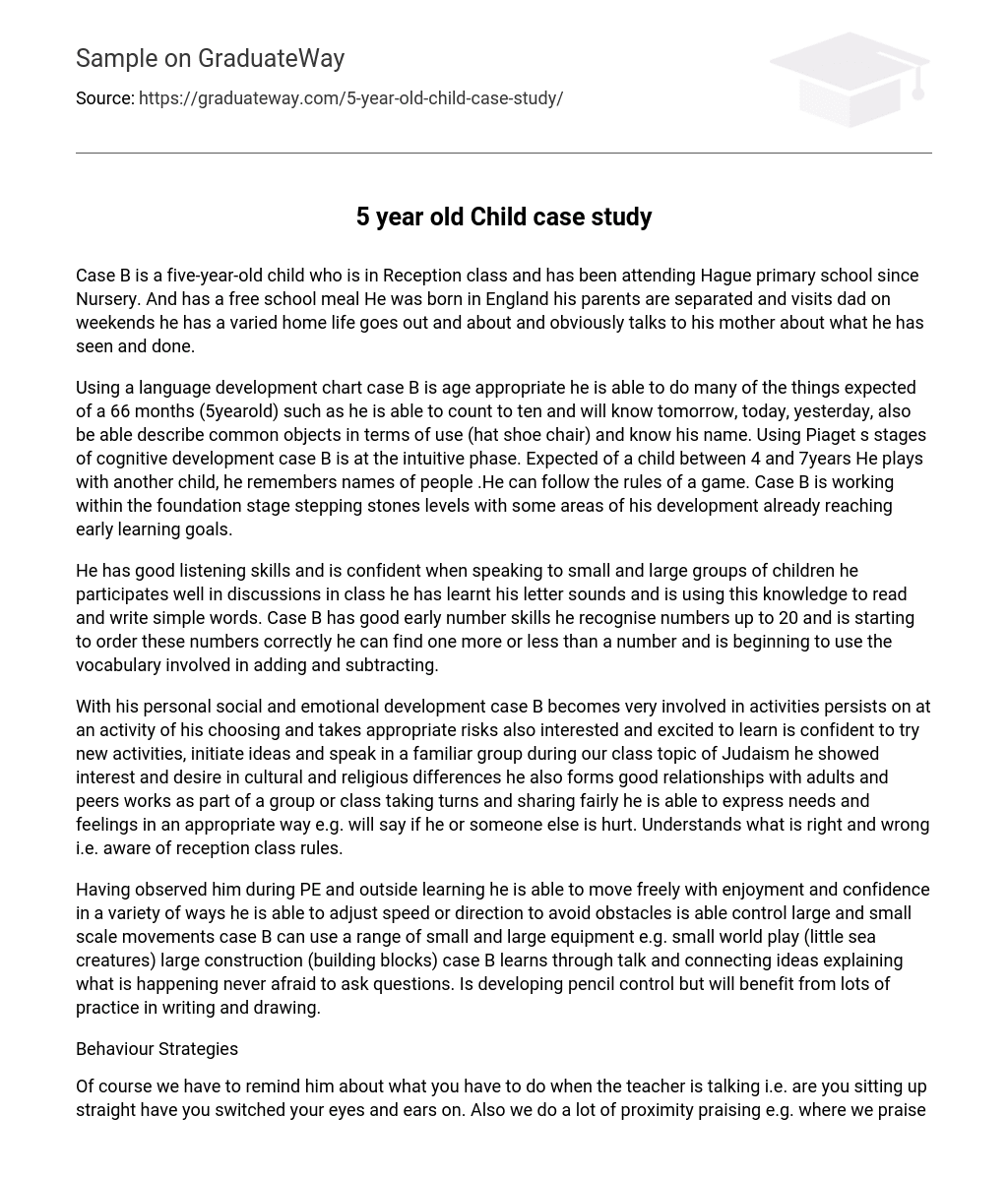Case B is a five-year-old child who is in Reception class and has been attending Hague primary school since Nursery. And has a free school meal He was born in England his parents are separated and visits dad on weekends he has a varied home life goes out and about and obviously talks to his mother about what he has seen and done.
Using a language development chart case B is age appropriate he is able to do many of the things expected of a 66 months (5yearold) such as he is able to count to ten and will know tomorrow, today, yesterday, also be able describe common objects in terms of use (hat shoe chair) and know his name. Using Piaget s stages of cognitive development case B is at the intuitive phase. Expected of a child between 4 and 7years He plays with another child, he remembers names of people .He can follow the rules of a game. Case B is working within the foundation stage stepping stones levels with some areas of his development already reaching early learning goals.
He has good listening skills and is confident when speaking to small and large groups of children he participates well in discussions in class he has learnt his letter sounds and is using this knowledge to read and write simple words. Case B has good early number skills he recognise numbers up to 20 and is starting to order these numbers correctly he can find one more or less than a number and is beginning to use the vocabulary involved in adding and subtracting.
With his personal social and emotional development case B becomes very involved in activities persists on at an activity of his choosing and takes appropriate risks also interested and excited to learn is confident to try new activities, initiate ideas and speak in a familiar group during our class topic of Judaism he showed interest and desire in cultural and religious differences he also forms good relationships with adults and peers works as part of a group or class taking turns and sharing fairly he is able to express needs and feelings in an appropriate way e.g. will say if he or someone else is hurt. Understands what is right and wrong i.e. aware of reception class rules.
Having observed him during PE and outside learning he is able to move freely with enjoyment and confidence in a variety of ways he is able to adjust speed or direction to avoid obstacles is able control large and small scale movements case B can use a range of small and large equipment e.g. small world play (little sea creatures) large construction (building blocks) case B learns through talk and connecting ideas explaining what is happening never afraid to ask questions. Is developing pencil control but will benefit from lots of practice in writing and drawing.
Behaviour Strategies
Of course we have to remind him about what you have to do when the teacher is talking i.e. are you sitting up straight have you switched your eyes and ears on. Also we do a lot of proximity praising e.g. where we praise the child sitting next to him so he notices and copies the other child who is focusing on the teacher also being his carpet partner e.g. positioning myself next to him.
For good behaviour we have stickers case B can receive a sticker for completing his homework and working hard in class we also have star of the week if case B has been working extra hard all week teacher or teaching assistant can choose him as star of the .week his photograph goes up on the wall. He will also receive a sticker in good behaviour assembly.
For unacceptable behaviour we have the three steps 1st step remind him of our class rules 2nd step we talk to him 3rd step sits at table by him self away from the rest of the class. He can join the rest of the class when he is ready to be sensible.
Self Esteem
Self esteem isn’t quite the same thing as confidence what is it? The word esteem comes from a Latin word which means ‘to estimate’ so self esteem is how you estimate yourself.
When introducing new things to Case B, we need to show him how to do an activity once and leave him to it. He will then come back to us and say ‘look I’ve done it’. We will then say well done. When he is handing out fruits during break time’, he will help the other children to peel their fruits. I.e. Satsuma’s and bananas we give him a. sticker for his sticker chart! For handling out the fruit so nicely and helping the other children, you can see the effect of praises, by the smile on his face. If he has done a good piece of work a postcard will be sent home, to the parent/carer. Before this, we explain to him why the postcard is being sent home. .
How We Record Progress
We use progress books which are records that go home to parents to see before their child’s report day. Also foundation stage stepping stones levels these are both formal. We record progress in formally using feed back sheets also verbal feed back to class teacher.
Confidentiality
Parent/cares can ask to see any thing written about their child .we should remember to keep all information written or verbal about a child or a family that is passed between staff and those adults who are directly involved in a situation is confidential. Finally, he likes to take part in plays and acting them out in assembly he is rarely absent from school infact he has only been absent six days since starting in September 2005. He is a confident member of reception class and pleasure to work with.





